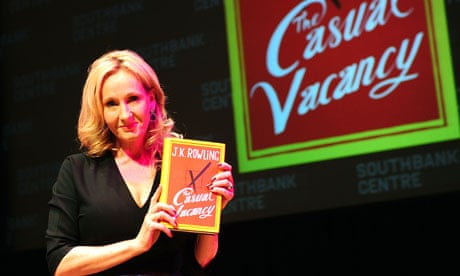By now, anyone who is interested in the extraordinary career of Harry Potter author JK Rowling will have gathered that her first novel for adults The Casual Vacancy, published a fortnight ago, is fiercely political. The plot of this 500-page satire-cum-tragedy revolves around an election. The author is furious with the complacent middle Englanders who run the fictional West Country town of Pagford, and furious above all about their callous disregard for the poor.
By focusing on a parish council, Rowling almost entirely avoids explicit mention of party politics, but it is perfectly obvious that the faction seeking to decouple Pagford from the sink estate on its outskirts are Tories. Their ally in this, and a second project to shut down a drug clinic in the service of public sector cuts, is grandee Aubrey Fawley, possessor of a fine old house and a seat on the district council.
Reaction to the novel on the right has been predictably outraged. The Daily Mail's Jan Moir denounced it as a "socialist manifesto masquerading as literature". Former Daily Telegraph editor Charles Moore apparently read it through such a fog of rage at its supposed political correctness that he mistook the town's Sikh GP for an "admirable" character (because non-white) when in fact she is the nastiest character by a mile.
Elsewhere, opinions have been mixed. Melvyn Bragg called it "stunning" and suggested Rowling's teenage underclass heroine Krystal Weedon would make the journey to posterity alongside Harry Potter himself.
But the liberal commentariat who might have been expected to cheer Rowling to the rafters have not done so – yet. Reviewers instead picked on points of style and disagreed about whether the first or second half of the book is best.
Other contemporary novelists attempting a state-of-the-nation snapshot – Rose Tremain, Sebastian Faulks – have tended to use a wider angle, bringing in such disparate points of view as east European migrants and jihadist terrorists. In focusing tightly on a single community, Rowling shows that it is in local matters that questions of value are at their sharpest and most inescapable; that it is in our choices regarding what most immediately concerns us (our neighbourhoods, our children's schools) that we are most ruthless and most exposed.
The book ducks national politics. Parish councils are rarely as powerful as Rowling suggests, and it doesn't really make sense that we hear nothing of the local MP or Conservative association. But to someone who has spent the past two years working towards the election of the first parish council in London, it is heartening to see grassroots politics treated with deadly seriousness.
Pagford parish has lost its way morally, with tragic consequences, but far from the nihilistic cynic some have labelled her, Rowling shows there is a way back. When Samantha Mollison, bored daughter-in-law of the novel's chief villain and owner of a failing bra shop, finds herself afflicted with an unfamiliar "desire to be absorbed in something bigger than herself", what does she do? She volunteers to become a councillor and hear the arguments for the drug clinic.
That Tory opinion-formers hate and fear this novel's influence enough to bother denouncing it is heartening for anyone who thinks books can shape as well as reflect the world in which they are made. But if anyone is in doubt that a novel published in 2012, even one with millions of readers, can do much to bring about the social transformation that is required if real-life Krystal Weedons are to get the chance in life that Pagford denies them, Rowling reminds us very clearly that there is another way: join the decision-makers. Get involved in politics.








